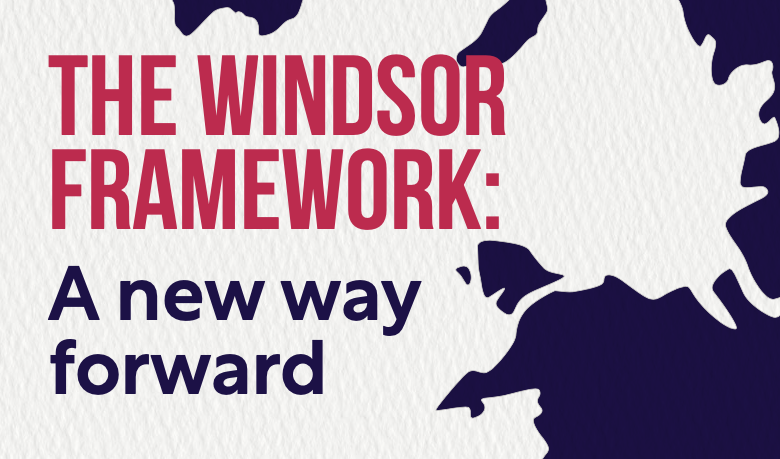27 FEBRUARY 2023 | NEWS
The UK and the EU have collectively announced the culmination of negotiations to find a solution to the trade and economic problems faced by Northern Ireland since leaving the EU.
In a joint press conference today, Prime Minister Rishi Sunak and President of the European Commission Ursula von der Leyen unveiled an outline of what has come to be known as the ‘Windsor Framework’.
“I am pleased to report that we have now made a decisive breakthrough – together, we have changed the original protocol and are today announcing the new Windsor Framework,” the Prime Minister said this afternoon.
“I believe that today’s framework addresses [Northern Ireland’s concerns] … I believe that what we have achieved today is a real breakthrough.”
Ms Von der Leyen called the deal a “new chapter” in Britain’s relations with the trade bloc, adding that she was grateful for “dear Rishi’s” approach to the negotiations.
In response to the developments, the Government has confirmed that it will drop its planned and highly controversial legislation – known as the Northern Ireland Protocol Bill – which was intended to allow the UK to unilaterally suspend elements of the Protocol, as agreed in international law. The Government has published a legal opinion saying that there is now “no legal justification” for this legislation to continue in Parliament.
But the Prime Minister will still need to square the Democratic Unionist Party in Northern Ireland on their response to the new arrangements agreed upon. The party’s leader, Sir Jeffery Donaldson, has said his senior team will take the time to look at the new deal in detail. The ERG (European Research Group), which is the main group of Conservative Eurosceptics in Parliament, has said it will follow the DUP’s lead in whichever decision it takes on the matter.
If they agree to it, this should also mean that it will be possible to restore the power-sharing agreement in Northern Ireland, thereby restarting the Assembly in Stormont.
The Framework implements the ‘green lane / red lane’ arrangements that it had been widely anticipated to include. ‘Green lane’ goods are those destined for Northern Ireland and will be subject to very few if any checks. ‘Red lane’ goods are those destined for the Republic of Ireland, which remains in the EU’s Single Market and Customs Union.
It also eliminates the requirement for export declarations on businesses moving goods from Great Britain to Northern Ireland. Bans on certain products entering Northern Ireland, including chilled sausages, seeded potatoes and species of trees, will be scrapped as well.
In a further wide range of improvements:
- People wishing to travel with their pets to Northern Ireland will now no longer need a health certificate and proof of vaccination issued by a vet beforehand;
- The UK regulator will approve medicines issued for use in Northern Ireland, not the European Medicines Agency;
- There will be no need for full customs declarations for parcels;
- UK VAT rules will apply for alcoholic beverages for immediate consumption, as well as for immovable goods – EU VAT rules will still apply for other items.
The new agreement also reduces the proportion of EU rules applying in Northern Ireland to around 3%, although the European Court of Justice will remain the final arbiter in any disputes surrounding those rules.
A further element of the new Framework, known as the ‘Stormont Brake’, will allow the Stormont Assembly to raise an objection to any new goods rules. If 30 or more MLAs from two or more parties sign a petition to that effect, there will be a 14-day consultation period. Following this, if the number of MLA objections remains 30 or more, there will be a vote in the Assembly. If this vote is won through support from both unionists and nationalists, the rule cannot be implemented in Northern Ireland.
This process, which can only be used for “significantly different” rules, and not for “trivial reasons”, will not be subject to oversight from the ECJ. However, the EU is entitled to take “appropriate remedial measures” if Northern Ireland begins to diverge significantly from its own regulatory framework.
The move is anticipated to ease the considerable trade barriers that currently exist between Great Britain and Northern Ireland significantly, ending the shortages on supermarket shelves that have been prevalent since the Protocol’s entry into force in 2021. However, several of its measures will be brought into force more gradually over the next couple of years.
The Framework remains subject to ratification on both sides at this juncture. A summary of its contents can be read here, while the joint Political Declaration can be read in full below:
political-declarationThe UK Government’s own paper on the new deal can also be read below:
The_Windsor_Framework_a_new_way_forward
























